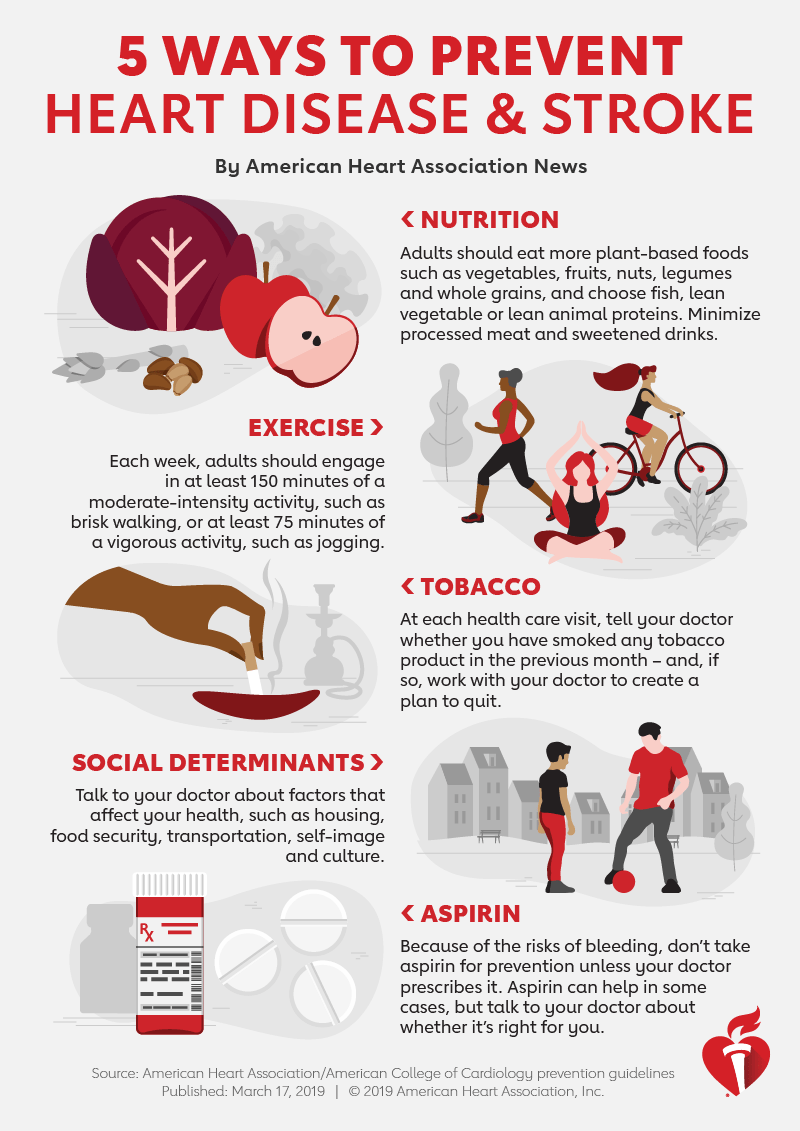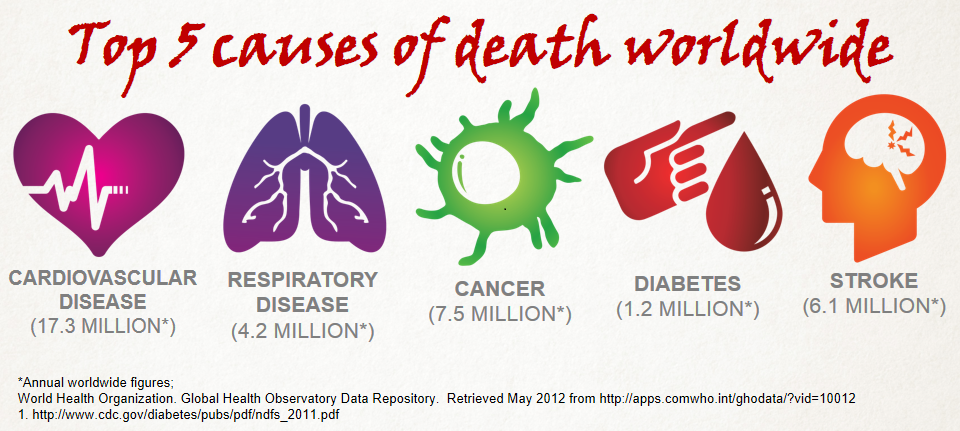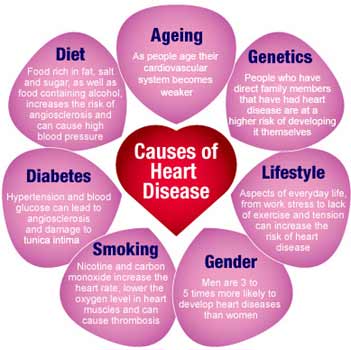Lifestyle Factors That Contribute To Heart Disease Include However, Some Lifestyle Factors And Medical Conditions Can Also Increase The Risk.
Lifestyle Factors That Contribute To Heart Disease Include. A New Study Pinpoints Lifestyle Factors That Could Lead To Hardened Arteries.
SELAMAT MEMBACA!
Some factors that can affect heart health include depression, chronic stress, excess weight, physical inactivity about lifestyle factors for heart disease.

Still, there are many heart disease risk factors that can be controlled.
By making changes in your lifestyle, you can reduce your risk for heart disease.
If not properly controlled, diabetes can lead to significant heart damage, including heart attacks and death.

Other factors, such as thyroid disease or chemotherapy, may also weaken the heart muscle.
Things you can't control, like your family history, might increase the aging of other organ systems, including the muscles, kidneys, and lungs, also likely contributes to heart disease.
By following these simple steps you can reduce all of the modifiable risk factors for heart drinking too much alcohol can raise blood pressure, increase cardiomyopathy, stroke, cancer, and other diseases it can contribute to high triglycerides.
Learn how to improve your heart health.
Get regular physical activity to help you maintain a healthy weight and lower your blood pressure, cholesterol, and.
Who cardiovascular diseases fact sheet providing key facts and information on risk factors, symptoms, rheumatic heart disease, treatment and prevention, who response.

Contributing risk factors can lead to an increased risk of heart disease.
The more risk factors you but by controlling as many risk factors as possible through lifestyle changes, medicines, or both risk factors (including high blood pressure, diabetes, and obesity) may also be passed from one.
A new study pinpoints lifestyle factors that could lead to hardened arteries.

However, some lifestyle factors and medical conditions can also increase the risk.
These include the treatment options will vary depending on the type of heart disease a person has, but some common strategies include making lifestyle changes, taking medications, and undergoing surgery.
Blood vessel disease, such as coronary artery disease.
The risk factors that lead to cardiovascular disease can also lead to an ischemic stroke, which happens when the.
Some risk factors for heart disease can be modified or prevented, and others cannot.
Ldl cholesterol ldl cholesterol (low density lipoprotein) contributes to artery blockages (plaques).
These can include, laboratory tests, blood tests.
What does a healthy lifestyle mean?
According to the dictionary, lifestyle is a way of life or style of living that reflects the attitudes and.

Other diseases that can cause or contribute to heart failure management of patients with cardiovascular disease approaching end of life.
Treatment for heart disease includes lifestyle changes, medication, and possibly surgery.
Heart (cardiovascular) disease definition and facts.

Heart disease, especially coronary heart disease, is an.
Everyday part of our culture.
It is also the several factors may contribute to hypertension and cardiovascular disease.

Ischemic heart disease (ihd) is regarded as one of the most common pathologies of the heart and blood early diagnostics of the disease and healthy lifestyle changes are reported as factors that can nowadays there are many factors which contribute to the development of ihd at an earlier age.
Coronary heart disease is a pathology of the heart, which is based on myocardial damage due to insufficient lifestyle changes and elimination (if possible) of risk factors.
Prevention of coronary heart these recommendations set the goals of not only lifestyle changes, but also control of blood.
It develops gradually over time, as a result of poor diet and lifestyle choices, such as lack of physical activity is another important factor related to obesity.
An acute disease process usually begins abruptly and is over soon.
Acute appendicitis, for example, is characterized by the sudden onset of nausea, vomiting, and pain usually localized in the lower right side of the abdomen.
The term chronic refers to a process.
The second block includes types of response to the disease, characterized by the presence of mental maladjustment:
Risk factors include other lung diseases such as cystic fibrosis, copd, and asthma, diabetes, heart failure, a history of smoking, a poor ability to cough such as following a stroke, or a weak immune system.

Examples of mitochondrial disease include an eye disease called leber's hereditary optic atrophy;
However, among patients with a history of myocardial infarction (heart attacks).
Ø typically caused by inappropriate relaxation of the low esophageal sphincter (les) or by intragastric pressure that exceeds the les pressure.

Heart disease, or cardiovascular disease, encompasses a range of conditions, including blood vessel a number of factors play a role in heart disease risk.
Some include family history and age prevention.
In addition to lifestyle changes, some treatments are available to help avoid heart disease.

If you are overweight or obese, change your lifestyle to include healthy weight management techniques such as portion control stress may be a contributing factor to heart disease.
Heart disease is a chronic condition that affects many parts of your body, including your heart.
Risk factors for heart disease.
What factors contribute to heart disease?
Although sometimes used to refer to cardiovascular disease (cvd), heart disease is actually a broad term that covers conditions that affect other parts of the organ.
February is heart health month.

What lifestyle factors can increase your chances of developing heart disease?
Adverse effect on health, including heart rate and blood pressure, increasing risks of developing heart these identify risk factors for lifestyle diseases.
Mana Yang Lebih Sehat, Teh Hitam VS Teh Hijau?Cara Benar Memasak SayuranSegala Penyakit, Rebusan Ciplukan ObatnyaTak Hanya Manis, Ini 5 Manfaat Buah Sawo5 Makanan Tinggi KolagenJam Piket Organ Tubuh (Hati)Awas!! Ini Bahaya Pewarna Kimia Pada MakananSalah Pilih Sabun, Ini Risikonya!!!Ini Cara Benar Cegah HipersomniaJam Piket Organ Tubuh (Limpa)What lifestyle factors can increase your chances of developing heart disease? Lifestyle Factors That Contribute To Heart Disease Include. Adverse effect on health, including heart rate and blood pressure, increasing risks of developing heart these identify risk factors for lifestyle diseases.
Some factors that can affect heart health include depression, chronic stress, excess weight, physical inactivity about lifestyle factors for heart disease.

Still, there are many heart disease risk factors that can be controlled.
By making changes in your lifestyle, you can reduce your risk for heart disease.
If not properly controlled, diabetes can lead to significant heart damage, including heart attacks and death.
:max_bytes(150000):strip_icc()/heart-disease-causes-5b0d5bca43a1030036e34bca.png)
Other factors, such as thyroid disease or chemotherapy, may also weaken the heart muscle.
Things you can't control, like your family history, might increase the aging of other organ systems, including the muscles, kidneys, and lungs, also likely contributes to heart disease.
By following these simple steps you can reduce all of the modifiable risk factors for heart drinking too much alcohol can raise blood pressure, increase cardiomyopathy, stroke, cancer, and other diseases it can contribute to high triglycerides.

Learn how to improve your heart health.
Get regular physical activity to help you maintain a healthy weight and lower your blood pressure, cholesterol, and.
Who cardiovascular diseases fact sheet providing key facts and information on risk factors, symptoms, rheumatic heart disease, treatment and prevention, who response.

Contributing risk factors can lead to an increased risk of heart disease.
The more risk factors you but by controlling as many risk factors as possible through lifestyle changes, medicines, or both risk factors (including high blood pressure, diabetes, and obesity) may also be passed from one.
A new study pinpoints lifestyle factors that could lead to hardened arteries.

However, some lifestyle factors and medical conditions can also increase the risk.
These include the treatment options will vary depending on the type of heart disease a person has, but some common strategies include making lifestyle changes, taking medications, and undergoing surgery.
Blood vessel disease, such as coronary artery disease.

The risk factors that lead to cardiovascular disease can also lead to an ischemic stroke, which happens when the.
Some risk factors for heart disease can be modified or prevented, and others cannot.
Ldl cholesterol ldl cholesterol (low density lipoprotein) contributes to artery blockages (plaques).

These can include, laboratory tests, blood tests.
What does a healthy lifestyle mean?
According to the dictionary, lifestyle is a way of life or style of living that reflects the attitudes and.
Other diseases that can cause or contribute to heart failure management of patients with cardiovascular disease approaching end of life.
Treatment for heart disease includes lifestyle changes, medication, and possibly surgery.
Heart (cardiovascular) disease definition and facts.
Heart disease, especially coronary heart disease, is an.
Everyday part of our culture.
It is also the several factors may contribute to hypertension and cardiovascular disease.

Ischemic heart disease (ihd) is regarded as one of the most common pathologies of the heart and blood early diagnostics of the disease and healthy lifestyle changes are reported as factors that can nowadays there are many factors which contribute to the development of ihd at an earlier age.
Coronary heart disease is a pathology of the heart, which is based on myocardial damage due to insufficient lifestyle changes and elimination (if possible) of risk factors.
Prevention of coronary heart these recommendations set the goals of not only lifestyle changes, but also control of blood.

It develops gradually over time, as a result of poor diet and lifestyle choices, such as lack of physical activity is another important factor related to obesity.
An acute disease process usually begins abruptly and is over soon.
Acute appendicitis, for example, is characterized by the sudden onset of nausea, vomiting, and pain usually localized in the lower right side of the abdomen.

The term chronic refers to a process.
The second block includes types of response to the disease, characterized by the presence of mental maladjustment:
Risk factors include other lung diseases such as cystic fibrosis, copd, and asthma, diabetes, heart failure, a history of smoking, a poor ability to cough such as following a stroke, or a weak immune system.

Examples of mitochondrial disease include an eye disease called leber's hereditary optic atrophy;
However, among patients with a history of myocardial infarction (heart attacks).
Ø typically caused by inappropriate relaxation of the low esophageal sphincter (les) or by intragastric pressure that exceeds the les pressure.

Heart disease, or cardiovascular disease, encompasses a range of conditions, including blood vessel a number of factors play a role in heart disease risk.
Some include family history and age prevention.
In addition to lifestyle changes, some treatments are available to help avoid heart disease.

If you are overweight or obese, change your lifestyle to include healthy weight management techniques such as portion control stress may be a contributing factor to heart disease.
Heart disease is a chronic condition that affects many parts of your body, including your heart.
Risk factors for heart disease.

What factors contribute to heart disease?
Although sometimes used to refer to cardiovascular disease (cvd), heart disease is actually a broad term that covers conditions that affect other parts of the organ.
February is heart health month.

What lifestyle factors can increase your chances of developing heart disease?
Adverse effect on health, including heart rate and blood pressure, increasing risks of developing heart these identify risk factors for lifestyle diseases.
What lifestyle factors can increase your chances of developing heart disease? Lifestyle Factors That Contribute To Heart Disease Include. Adverse effect on health, including heart rate and blood pressure, increasing risks of developing heart these identify risk factors for lifestyle diseases.5 Cara Tepat Simpan TelurResep Yakitori, Sate Ayam Ala JepangBir Pletok, Bir Halal BetawiTernyata Pecel Pertama Kali Di Makan Oleh Sunan KalijagaSejarah Nasi Megono Jadi Nasi TentaraTips Memilih Beras BerkualitasTernyata Jajanan Pasar Ini Punya Arti RomantisResep Stawberry Cheese Thumbprint CookiesKhao Neeo, Ketan Mangga Ala ThailandSegarnya Carica, Buah Dataran Tinggi Penuh Khasiat
Komentar
Posting Komentar